University Report: Entrepreneurship and Small Businesses Management
VerifiedAdded on 2023/01/18
|17
|5159
|43
Report
AI Summary
This report delves into the realm of entrepreneurship and small business management, exploring various types of entrepreneurial ventures, including small-scale, scalable start-ups, and large company ventures, while also examining the typology of entrepreneurship based on factors such as gender, lifestyle, and survival. The report analyzes the differences and similarities between these ventures, highlighting the distinctions between large and small businesses, public and corporate sectors, and social versus scalable start-ups. Furthermore, it emphasizes the crucial role of micro and small businesses in economic development, citing relevant data and statistics on employment and GDP contribution. The report also discusses the importance of small businesses and start-ups in the growth of the social economy, along with the characteristics, traits, and skills of successful entrepreneurs. The report investigates entrepreneurial motivation and mindset, as well as the background and experience of entrepreneurs that foster their success.

Entrepreneurship and
Small Businesses
Management
Small Businesses
Management
Paraphrase This Document
Need a fresh take? Get an instant paraphrase of this document with our AI Paraphraser
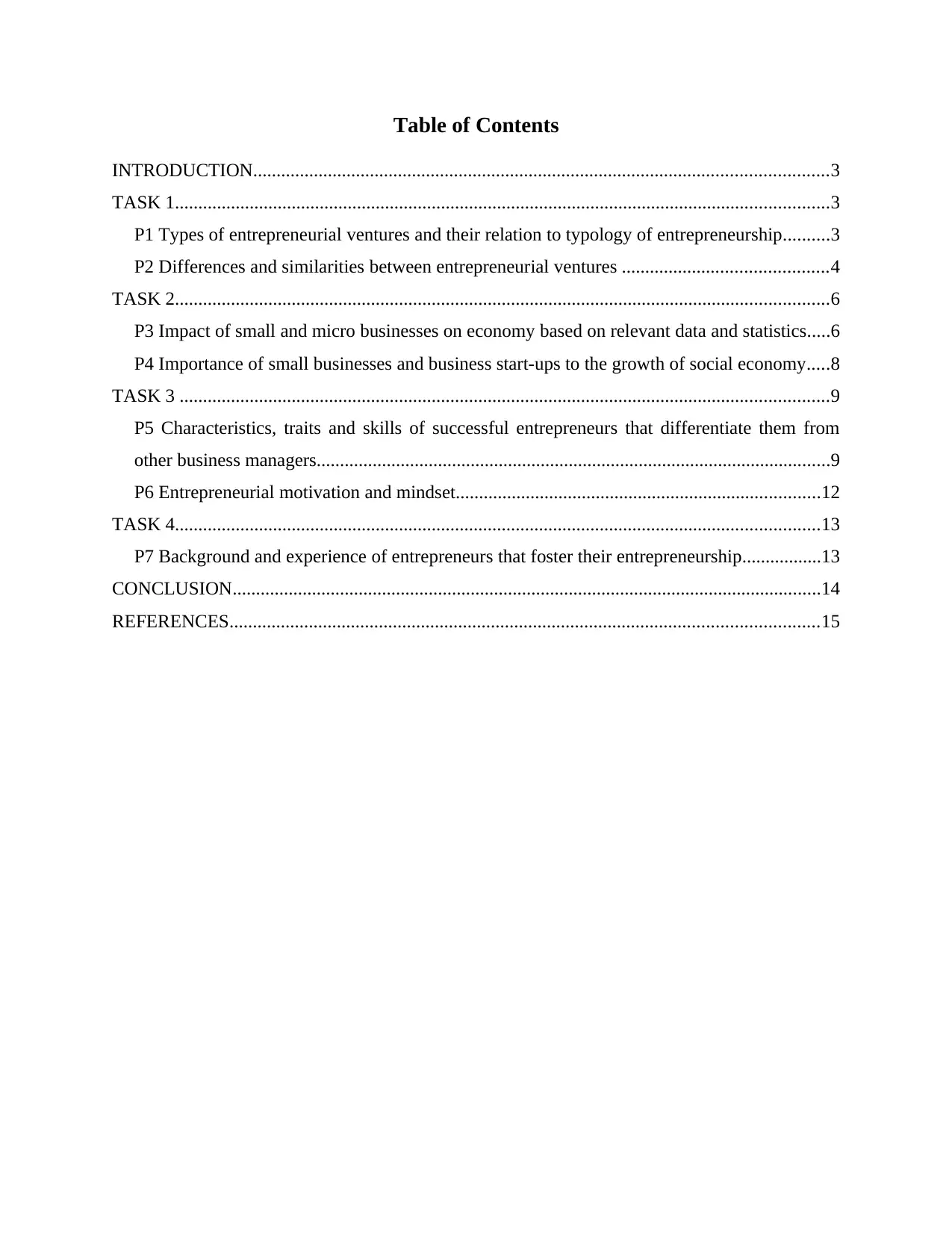
Table of Contents
INTRODUCTION...........................................................................................................................3
TASK 1............................................................................................................................................3
P1 Types of entrepreneurial ventures and their relation to typology of entrepreneurship..........3
P2 Differences and similarities between entrepreneurial ventures ............................................4
TASK 2............................................................................................................................................6
P3 Impact of small and micro businesses on economy based on relevant data and statistics.....6
P4 Importance of small businesses and business start-ups to the growth of social economy.....8
TASK 3 ...........................................................................................................................................9
P5 Characteristics, traits and skills of successful entrepreneurs that differentiate them from
other business managers..............................................................................................................9
P6 Entrepreneurial motivation and mindset..............................................................................12
TASK 4..........................................................................................................................................13
P7 Background and experience of entrepreneurs that foster their entrepreneurship.................13
CONCLUSION..............................................................................................................................14
REFERENCES..............................................................................................................................15
INTRODUCTION...........................................................................................................................3
TASK 1............................................................................................................................................3
P1 Types of entrepreneurial ventures and their relation to typology of entrepreneurship..........3
P2 Differences and similarities between entrepreneurial ventures ............................................4
TASK 2............................................................................................................................................6
P3 Impact of small and micro businesses on economy based on relevant data and statistics.....6
P4 Importance of small businesses and business start-ups to the growth of social economy.....8
TASK 3 ...........................................................................................................................................9
P5 Characteristics, traits and skills of successful entrepreneurs that differentiate them from
other business managers..............................................................................................................9
P6 Entrepreneurial motivation and mindset..............................................................................12
TASK 4..........................................................................................................................................13
P7 Background and experience of entrepreneurs that foster their entrepreneurship.................13
CONCLUSION..............................................................................................................................14
REFERENCES..............................................................................................................................15
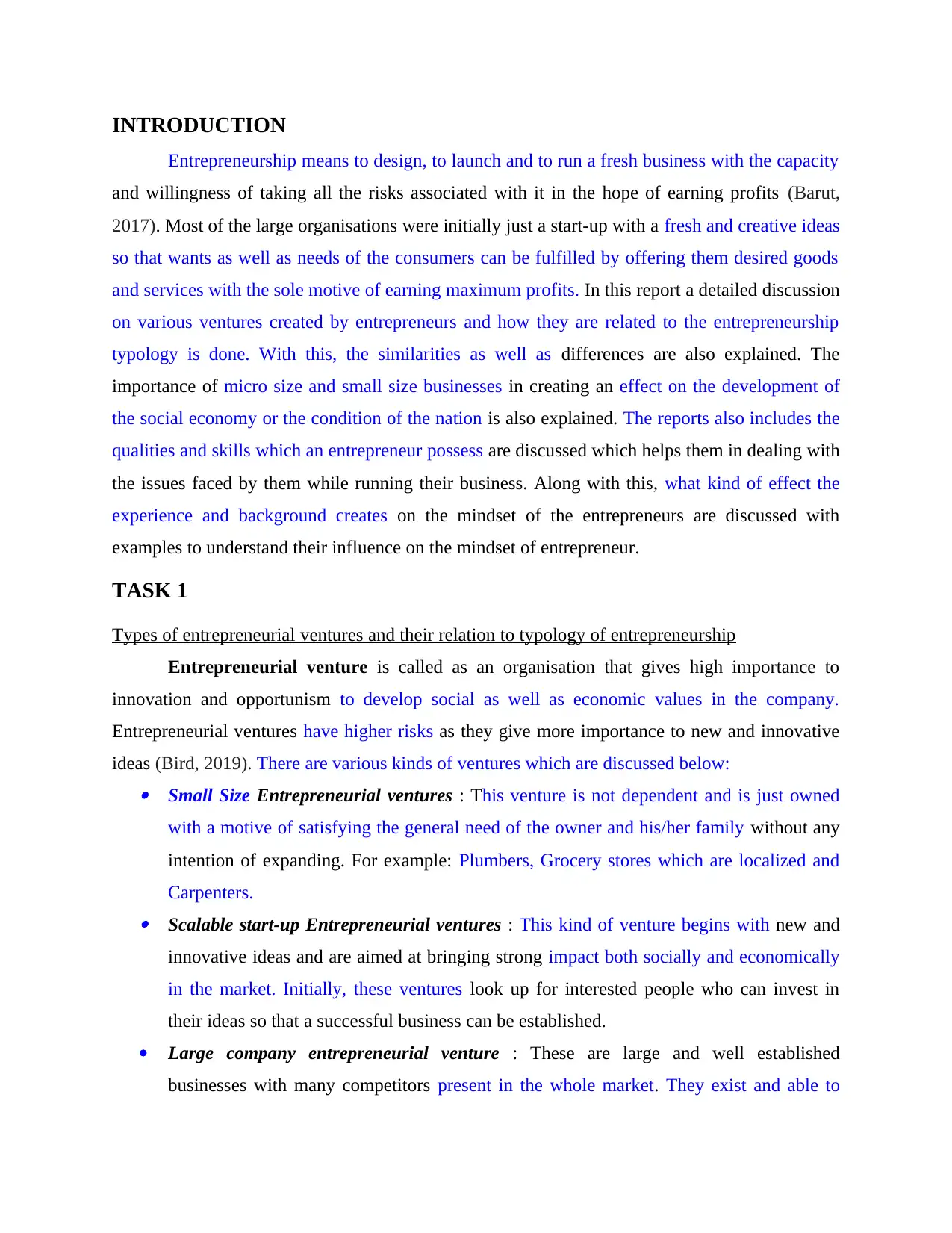
INTRODUCTION
Entrepreneurship means to design, to launch and to run a fresh business with the capacity
and willingness of taking all the risks associated with it in the hope of earning profits (Barut,
2017). Most of the large organisations were initially just a start-up with a fresh and creative ideas
so that wants as well as needs of the consumers can be fulfilled by offering them desired goods
and services with the sole motive of earning maximum profits. In this report a detailed discussion
on various ventures created by entrepreneurs and how they are related to the entrepreneurship
typology is done. With this, the similarities as well as differences are also explained. The
importance of micro size and small size businesses in creating an effect on the development of
the social economy or the condition of the nation is also explained. The reports also includes the
qualities and skills which an entrepreneur possess are discussed which helps them in dealing with
the issues faced by them while running their business. Along with this, what kind of effect the
experience and background creates on the mindset of the entrepreneurs are discussed with
examples to understand their influence on the mindset of entrepreneur.
TASK 1
Types of entrepreneurial ventures and their relation to typology of entrepreneurship
Entrepreneurial venture is called as an organisation that gives high importance to
innovation and opportunism to develop social as well as economic values in the company.
Entrepreneurial ventures have higher risks as they give more importance to new and innovative
ideas (Bird, 2019). There are various kinds of ventures which are discussed below: Small Size Entrepreneurial ventures : This venture is not dependent and is just owned
with a motive of satisfying the general need of the owner and his/her family without any
intention of expanding. For example: Plumbers, Grocery stores which are localized and
Carpenters. Scalable start-up Entrepreneurial ventures : This kind of venture begins with new and
innovative ideas and are aimed at bringing strong impact both socially and economically
in the market. Initially, these ventures look up for interested people who can invest in
their ideas so that a successful business can be established.
Large company entrepreneurial venture : These are large and well established
businesses with many competitors present in the whole market. They exist and able to
Entrepreneurship means to design, to launch and to run a fresh business with the capacity
and willingness of taking all the risks associated with it in the hope of earning profits (Barut,
2017). Most of the large organisations were initially just a start-up with a fresh and creative ideas
so that wants as well as needs of the consumers can be fulfilled by offering them desired goods
and services with the sole motive of earning maximum profits. In this report a detailed discussion
on various ventures created by entrepreneurs and how they are related to the entrepreneurship
typology is done. With this, the similarities as well as differences are also explained. The
importance of micro size and small size businesses in creating an effect on the development of
the social economy or the condition of the nation is also explained. The reports also includes the
qualities and skills which an entrepreneur possess are discussed which helps them in dealing with
the issues faced by them while running their business. Along with this, what kind of effect the
experience and background creates on the mindset of the entrepreneurs are discussed with
examples to understand their influence on the mindset of entrepreneur.
TASK 1
Types of entrepreneurial ventures and their relation to typology of entrepreneurship
Entrepreneurial venture is called as an organisation that gives high importance to
innovation and opportunism to develop social as well as economic values in the company.
Entrepreneurial ventures have higher risks as they give more importance to new and innovative
ideas (Bird, 2019). There are various kinds of ventures which are discussed below: Small Size Entrepreneurial ventures : This venture is not dependent and is just owned
with a motive of satisfying the general need of the owner and his/her family without any
intention of expanding. For example: Plumbers, Grocery stores which are localized and
Carpenters. Scalable start-up Entrepreneurial ventures : This kind of venture begins with new and
innovative ideas and are aimed at bringing strong impact both socially and economically
in the market. Initially, these ventures look up for interested people who can invest in
their ideas so that a successful business can be established.
Large company entrepreneurial venture : These are large and well established
businesses with many competitors present in the whole market. They exist and able to
⊘ This is a preview!⊘
Do you want full access?
Subscribe today to unlock all pages.

Trusted by 1+ million students worldwide
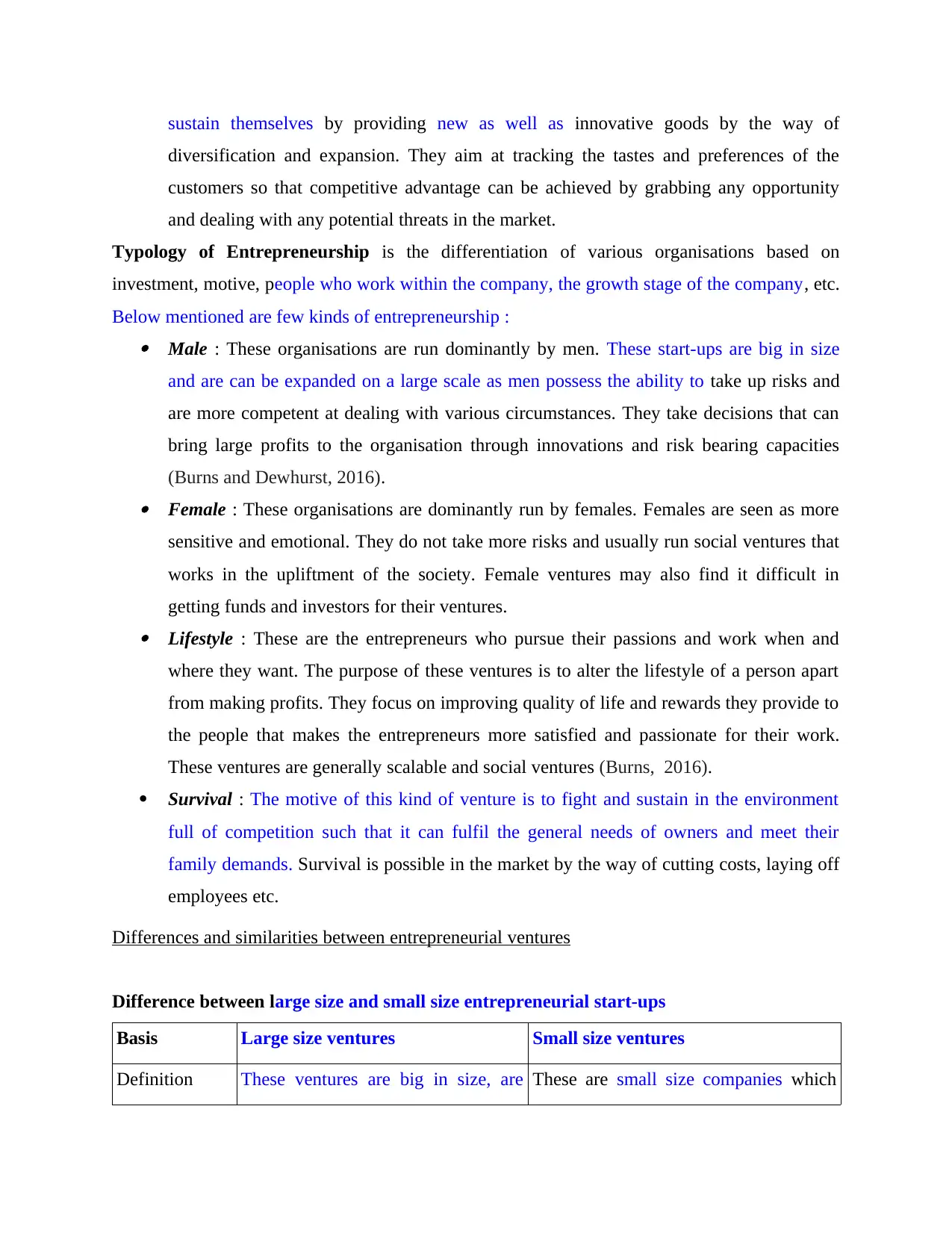
sustain themselves by providing new as well as innovative goods by the way of
diversification and expansion. They aim at tracking the tastes and preferences of the
customers so that competitive advantage can be achieved by grabbing any opportunity
and dealing with any potential threats in the market.
Typology of Entrepreneurship is the differentiation of various organisations based on
investment, motive, people who work within the company, the growth stage of the company, etc.
Below mentioned are few kinds of entrepreneurship : Male : These organisations are run dominantly by men. These start-ups are big in size
and are can be expanded on a large scale as men possess the ability to take up risks and
are more competent at dealing with various circumstances. They take decisions that can
bring large profits to the organisation through innovations and risk bearing capacities
(Burns and Dewhurst, 2016). Female : These organisations are dominantly run by females. Females are seen as more
sensitive and emotional. They do not take more risks and usually run social ventures that
works in the upliftment of the society. Female ventures may also find it difficult in
getting funds and investors for their ventures. Lifestyle : These are the entrepreneurs who pursue their passions and work when and
where they want. The purpose of these ventures is to alter the lifestyle of a person apart
from making profits. They focus on improving quality of life and rewards they provide to
the people that makes the entrepreneurs more satisfied and passionate for their work.
These ventures are generally scalable and social ventures (Burns, 2016).
Survival : The motive of this kind of venture is to fight and sustain in the environment
full of competition such that it can fulfil the general needs of owners and meet their
family demands. Survival is possible in the market by the way of cutting costs, laying off
employees etc.
Differences and similarities between entrepreneurial ventures
Difference between large size and small size entrepreneurial start-ups
Basis Large size ventures Small size ventures
Definition These ventures are big in size, are These are small size companies which
diversification and expansion. They aim at tracking the tastes and preferences of the
customers so that competitive advantage can be achieved by grabbing any opportunity
and dealing with any potential threats in the market.
Typology of Entrepreneurship is the differentiation of various organisations based on
investment, motive, people who work within the company, the growth stage of the company, etc.
Below mentioned are few kinds of entrepreneurship : Male : These organisations are run dominantly by men. These start-ups are big in size
and are can be expanded on a large scale as men possess the ability to take up risks and
are more competent at dealing with various circumstances. They take decisions that can
bring large profits to the organisation through innovations and risk bearing capacities
(Burns and Dewhurst, 2016). Female : These organisations are dominantly run by females. Females are seen as more
sensitive and emotional. They do not take more risks and usually run social ventures that
works in the upliftment of the society. Female ventures may also find it difficult in
getting funds and investors for their ventures. Lifestyle : These are the entrepreneurs who pursue their passions and work when and
where they want. The purpose of these ventures is to alter the lifestyle of a person apart
from making profits. They focus on improving quality of life and rewards they provide to
the people that makes the entrepreneurs more satisfied and passionate for their work.
These ventures are generally scalable and social ventures (Burns, 2016).
Survival : The motive of this kind of venture is to fight and sustain in the environment
full of competition such that it can fulfil the general needs of owners and meet their
family demands. Survival is possible in the market by the way of cutting costs, laying off
employees etc.
Differences and similarities between entrepreneurial ventures
Difference between large size and small size entrepreneurial start-ups
Basis Large size ventures Small size ventures
Definition These ventures are big in size, are These are small size companies which
Paraphrase This Document
Need a fresh take? Get an instant paraphrase of this document with our AI Paraphraser
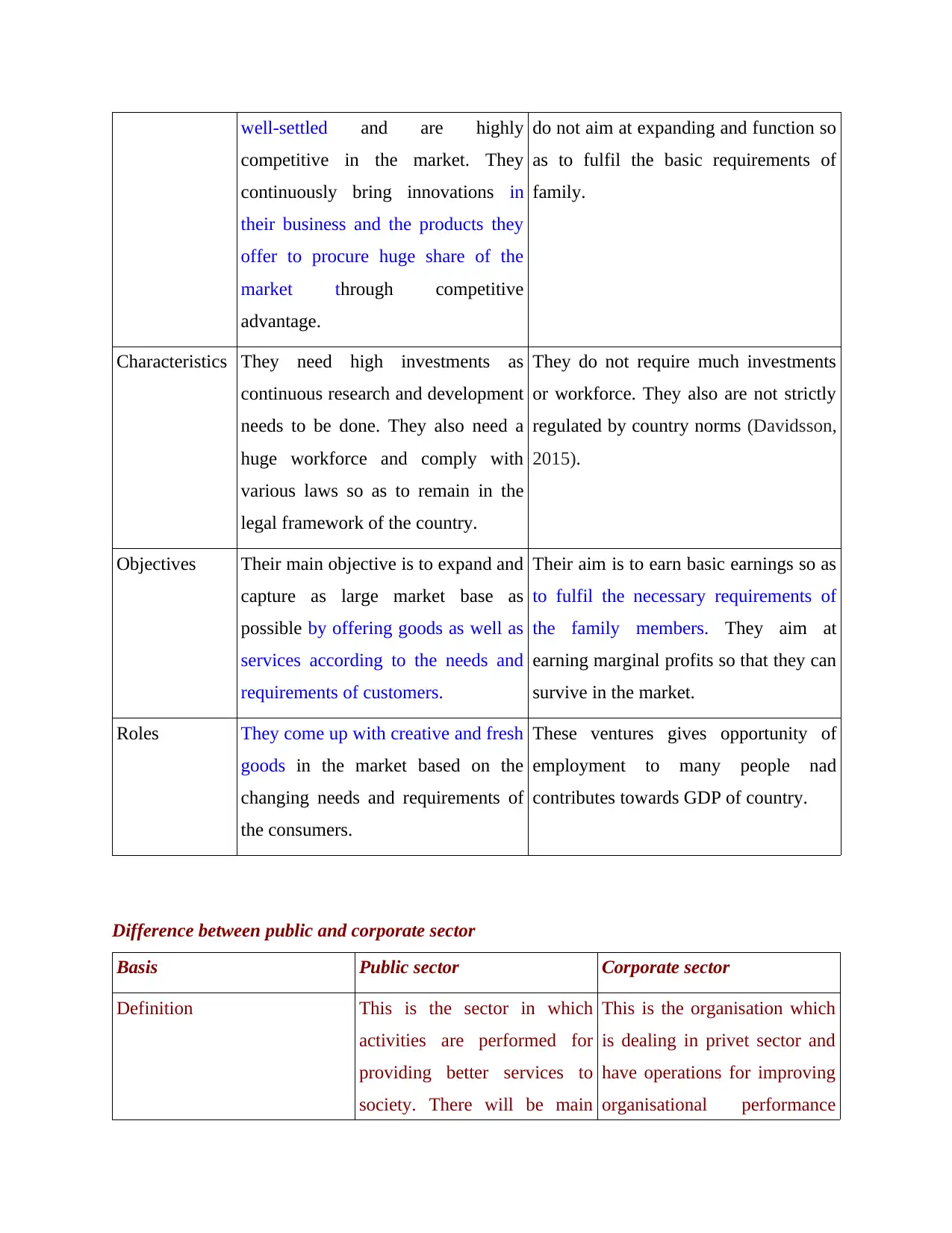
well-settled and are highly
competitive in the market. They
continuously bring innovations in
their business and the products they
offer to procure huge share of the
market through competitive
advantage.
do not aim at expanding and function so
as to fulfil the basic requirements of
family.
Characteristics They need high investments as
continuous research and development
needs to be done. They also need a
huge workforce and comply with
various laws so as to remain in the
legal framework of the country.
They do not require much investments
or workforce. They also are not strictly
regulated by country norms (Davidsson,
2015).
Objectives Their main objective is to expand and
capture as large market base as
possible by offering goods as well as
services according to the needs and
requirements of customers.
Their aim is to earn basic earnings so as
to fulfil the necessary requirements of
the family members. They aim at
earning marginal profits so that they can
survive in the market.
Roles They come up with creative and fresh
goods in the market based on the
changing needs and requirements of
the consumers.
These ventures gives opportunity of
employment to many people nad
contributes towards GDP of country.
Difference between public and corporate sector
Basis Public sector Corporate sector
Definition This is the sector in which
activities are performed for
providing better services to
society. There will be main
This is the organisation which
is dealing in privet sector and
have operations for improving
organisational performance
competitive in the market. They
continuously bring innovations in
their business and the products they
offer to procure huge share of the
market through competitive
advantage.
do not aim at expanding and function so
as to fulfil the basic requirements of
family.
Characteristics They need high investments as
continuous research and development
needs to be done. They also need a
huge workforce and comply with
various laws so as to remain in the
legal framework of the country.
They do not require much investments
or workforce. They also are not strictly
regulated by country norms (Davidsson,
2015).
Objectives Their main objective is to expand and
capture as large market base as
possible by offering goods as well as
services according to the needs and
requirements of customers.
Their aim is to earn basic earnings so as
to fulfil the necessary requirements of
the family members. They aim at
earning marginal profits so that they can
survive in the market.
Roles They come up with creative and fresh
goods in the market based on the
changing needs and requirements of
the consumers.
These ventures gives opportunity of
employment to many people nad
contributes towards GDP of country.
Difference between public and corporate sector
Basis Public sector Corporate sector
Definition This is the sector in which
activities are performed for
providing better services to
society. There will be main
This is the organisation which
is dealing in privet sector and
have operations for improving
organisational performance
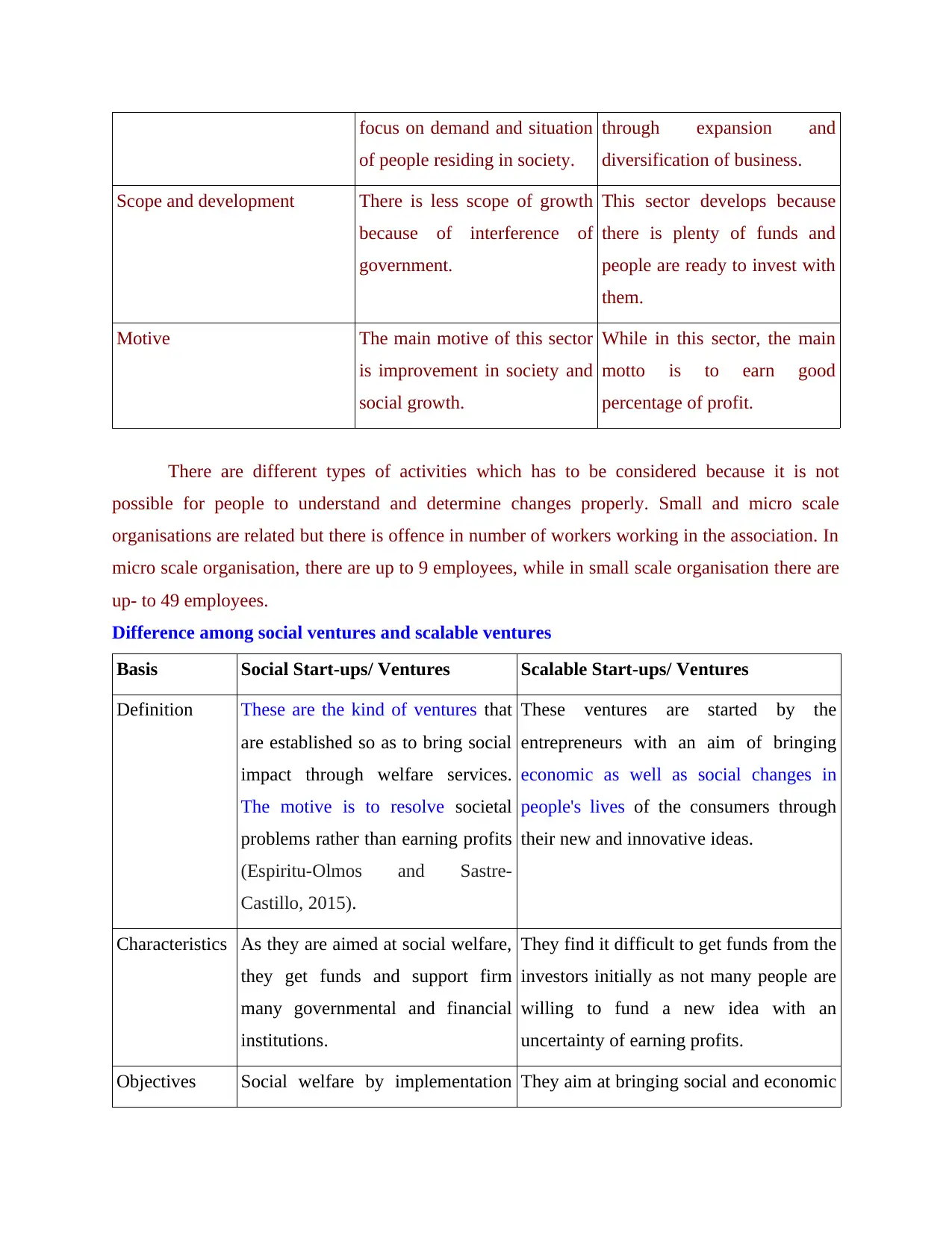
focus on demand and situation
of people residing in society.
through expansion and
diversification of business.
Scope and development There is less scope of growth
because of interference of
government.
This sector develops because
there is plenty of funds and
people are ready to invest with
them.
Motive The main motive of this sector
is improvement in society and
social growth.
While in this sector, the main
motto is to earn good
percentage of profit.
There are different types of activities which has to be considered because it is not
possible for people to understand and determine changes properly. Small and micro scale
organisations are related but there is offence in number of workers working in the association. In
micro scale organisation, there are up to 9 employees, while in small scale organisation there are
up- to 49 employees.
Difference among social ventures and scalable ventures
Basis Social Start-ups/ Ventures Scalable Start-ups/ Ventures
Definition These are the kind of ventures that
are established so as to bring social
impact through welfare services.
The motive is to resolve societal
problems rather than earning profits
(Espiritu-Olmos and Sastre-
Castillo, 2015).
These ventures are started by the
entrepreneurs with an aim of bringing
economic as well as social changes in
people's lives of the consumers through
their new and innovative ideas.
Characteristics As they are aimed at social welfare,
they get funds and support firm
many governmental and financial
institutions.
They find it difficult to get funds from the
investors initially as not many people are
willing to fund a new idea with an
uncertainty of earning profits.
Objectives Social welfare by implementation They aim at bringing social and economic
of people residing in society.
through expansion and
diversification of business.
Scope and development There is less scope of growth
because of interference of
government.
This sector develops because
there is plenty of funds and
people are ready to invest with
them.
Motive The main motive of this sector
is improvement in society and
social growth.
While in this sector, the main
motto is to earn good
percentage of profit.
There are different types of activities which has to be considered because it is not
possible for people to understand and determine changes properly. Small and micro scale
organisations are related but there is offence in number of workers working in the association. In
micro scale organisation, there are up to 9 employees, while in small scale organisation there are
up- to 49 employees.
Difference among social ventures and scalable ventures
Basis Social Start-ups/ Ventures Scalable Start-ups/ Ventures
Definition These are the kind of ventures that
are established so as to bring social
impact through welfare services.
The motive is to resolve societal
problems rather than earning profits
(Espiritu-Olmos and Sastre-
Castillo, 2015).
These ventures are started by the
entrepreneurs with an aim of bringing
economic as well as social changes in
people's lives of the consumers through
their new and innovative ideas.
Characteristics As they are aimed at social welfare,
they get funds and support firm
many governmental and financial
institutions.
They find it difficult to get funds from the
investors initially as not many people are
willing to fund a new idea with an
uncertainty of earning profits.
Objectives Social welfare by implementation They aim at bringing social and economic
⊘ This is a preview!⊘
Do you want full access?
Subscribe today to unlock all pages.

Trusted by 1+ million students worldwide
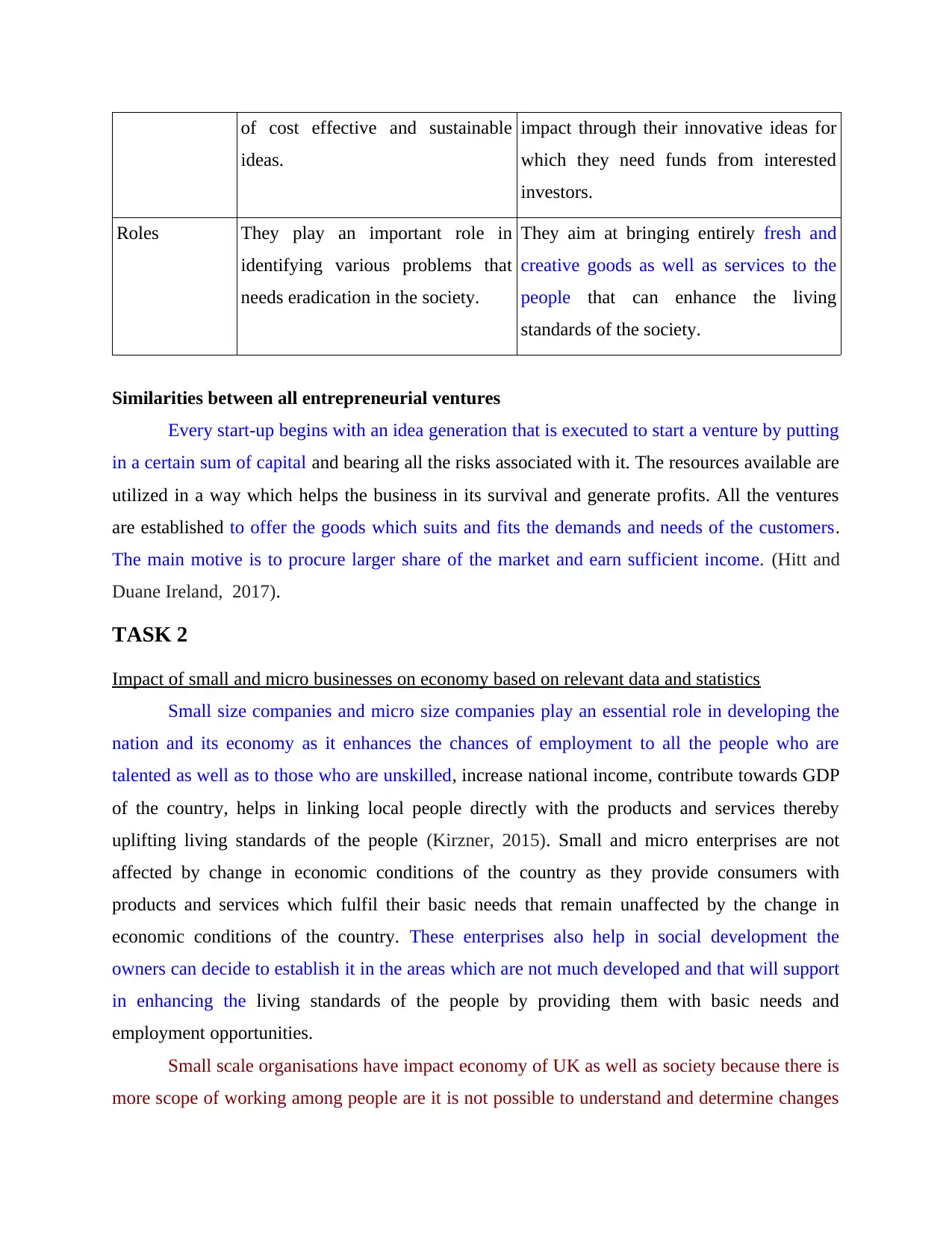
of cost effective and sustainable
ideas.
impact through their innovative ideas for
which they need funds from interested
investors.
Roles They play an important role in
identifying various problems that
needs eradication in the society.
They aim at bringing entirely fresh and
creative goods as well as services to the
people that can enhance the living
standards of the society.
Similarities between all entrepreneurial ventures
Every start-up begins with an idea generation that is executed to start a venture by putting
in a certain sum of capital and bearing all the risks associated with it. The resources available are
utilized in a way which helps the business in its survival and generate profits. All the ventures
are established to offer the goods which suits and fits the demands and needs of the customers.
The main motive is to procure larger share of the market and earn sufficient income. (Hitt and
Duane Ireland, 2017).
TASK 2
Impact of small and micro businesses on economy based on relevant data and statistics
Small size companies and micro size companies play an essential role in developing the
nation and its economy as it enhances the chances of employment to all the people who are
talented as well as to those who are unskilled, increase national income, contribute towards GDP
of the country, helps in linking local people directly with the products and services thereby
uplifting living standards of the people (Kirzner, 2015). Small and micro enterprises are not
affected by change in economic conditions of the country as they provide consumers with
products and services which fulfil their basic needs that remain unaffected by the change in
economic conditions of the country. These enterprises also help in social development the
owners can decide to establish it in the areas which are not much developed and that will support
in enhancing the living standards of the people by providing them with basic needs and
employment opportunities.
Small scale organisations have impact economy of UK as well as society because there is
more scope of working among people are it is not possible to understand and determine changes
ideas.
impact through their innovative ideas for
which they need funds from interested
investors.
Roles They play an important role in
identifying various problems that
needs eradication in the society.
They aim at bringing entirely fresh and
creative goods as well as services to the
people that can enhance the living
standards of the society.
Similarities between all entrepreneurial ventures
Every start-up begins with an idea generation that is executed to start a venture by putting
in a certain sum of capital and bearing all the risks associated with it. The resources available are
utilized in a way which helps the business in its survival and generate profits. All the ventures
are established to offer the goods which suits and fits the demands and needs of the customers.
The main motive is to procure larger share of the market and earn sufficient income. (Hitt and
Duane Ireland, 2017).
TASK 2
Impact of small and micro businesses on economy based on relevant data and statistics
Small size companies and micro size companies play an essential role in developing the
nation and its economy as it enhances the chances of employment to all the people who are
talented as well as to those who are unskilled, increase national income, contribute towards GDP
of the country, helps in linking local people directly with the products and services thereby
uplifting living standards of the people (Kirzner, 2015). Small and micro enterprises are not
affected by change in economic conditions of the country as they provide consumers with
products and services which fulfil their basic needs that remain unaffected by the change in
economic conditions of the country. These enterprises also help in social development the
owners can decide to establish it in the areas which are not much developed and that will support
in enhancing the living standards of the people by providing them with basic needs and
employment opportunities.
Small scale organisations have impact economy of UK as well as society because there is
more scope of working among people are it is not possible to understand and determine changes
Paraphrase This Document
Need a fresh take? Get an instant paraphrase of this document with our AI Paraphraser
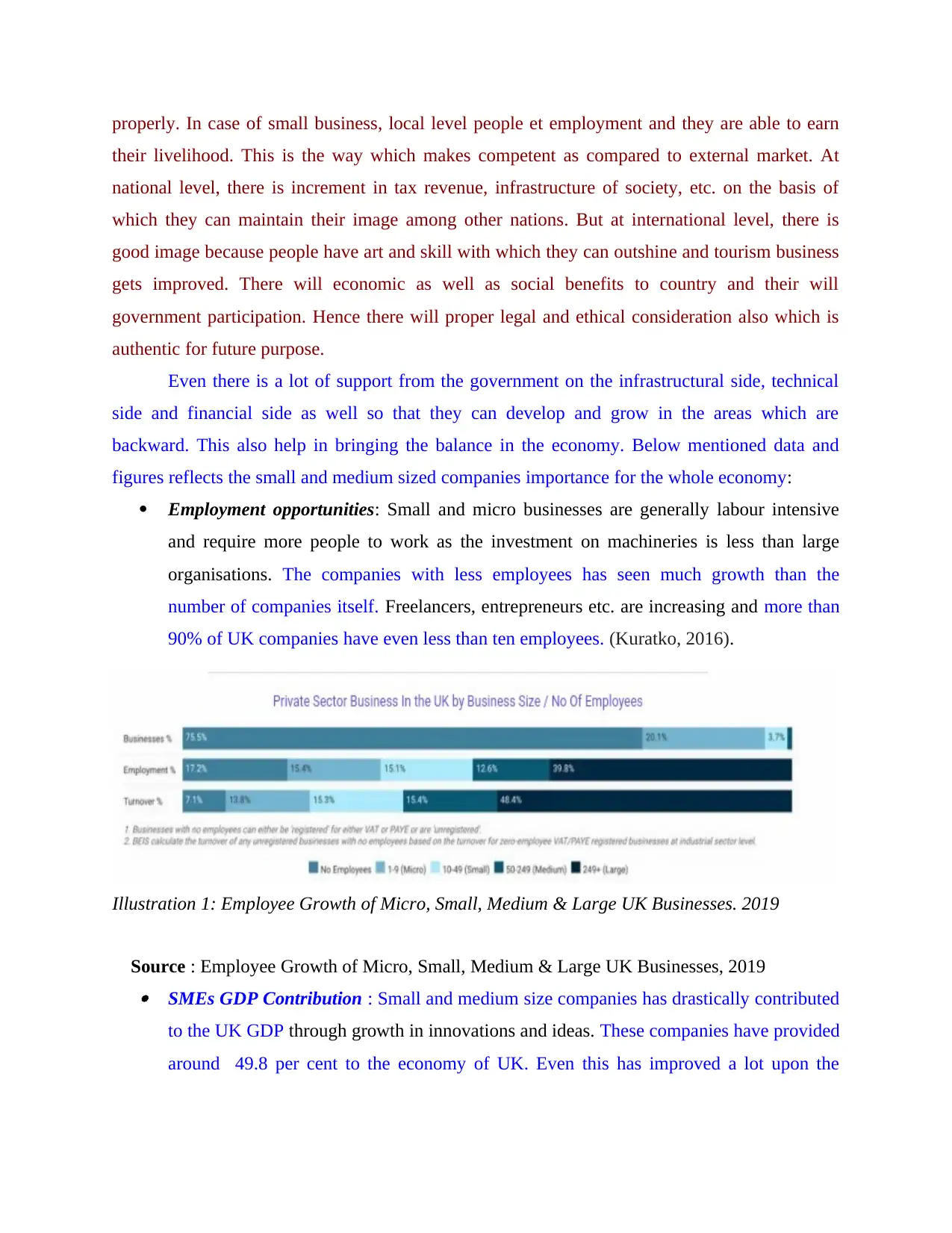
properly. In case of small business, local level people et employment and they are able to earn
their livelihood. This is the way which makes competent as compared to external market. At
national level, there is increment in tax revenue, infrastructure of society, etc. on the basis of
which they can maintain their image among other nations. But at international level, there is
good image because people have art and skill with which they can outshine and tourism business
gets improved. There will economic as well as social benefits to country and their will
government participation. Hence there will proper legal and ethical consideration also which is
authentic for future purpose.
Even there is a lot of support from the government on the infrastructural side, technical
side and financial side as well so that they can develop and grow in the areas which are
backward. This also help in bringing the balance in the economy. Below mentioned data and
figures reflects the small and medium sized companies importance for the whole economy:
Employment opportunities: Small and micro businesses are generally labour intensive
and require more people to work as the investment on machineries is less than large
organisations. The companies with less employees has seen much growth than the
number of companies itself. Freelancers, entrepreneurs etc. are increasing and more than
90% of UK companies have even less than ten employees. (Kuratko, 2016).
Illustration 1: Employee Growth of Micro, Small, Medium & Large UK Businesses. 2019
Source : Employee Growth of Micro, Small, Medium & Large UK Businesses, 2019 SMEs GDP Contribution : Small and medium size companies has drastically contributed
to the UK GDP through growth in innovations and ideas. These companies have provided
around 49.8 per cent to the economy of UK. Even this has improved a lot upon the
their livelihood. This is the way which makes competent as compared to external market. At
national level, there is increment in tax revenue, infrastructure of society, etc. on the basis of
which they can maintain their image among other nations. But at international level, there is
good image because people have art and skill with which they can outshine and tourism business
gets improved. There will economic as well as social benefits to country and their will
government participation. Hence there will proper legal and ethical consideration also which is
authentic for future purpose.
Even there is a lot of support from the government on the infrastructural side, technical
side and financial side as well so that they can develop and grow in the areas which are
backward. This also help in bringing the balance in the economy. Below mentioned data and
figures reflects the small and medium sized companies importance for the whole economy:
Employment opportunities: Small and micro businesses are generally labour intensive
and require more people to work as the investment on machineries is less than large
organisations. The companies with less employees has seen much growth than the
number of companies itself. Freelancers, entrepreneurs etc. are increasing and more than
90% of UK companies have even less than ten employees. (Kuratko, 2016).
Illustration 1: Employee Growth of Micro, Small, Medium & Large UK Businesses. 2019
Source : Employee Growth of Micro, Small, Medium & Large UK Businesses, 2019 SMEs GDP Contribution : Small and medium size companies has drastically contributed
to the UK GDP through growth in innovations and ideas. These companies have provided
around 49.8 per cent to the economy of UK. Even this has improved a lot upon the
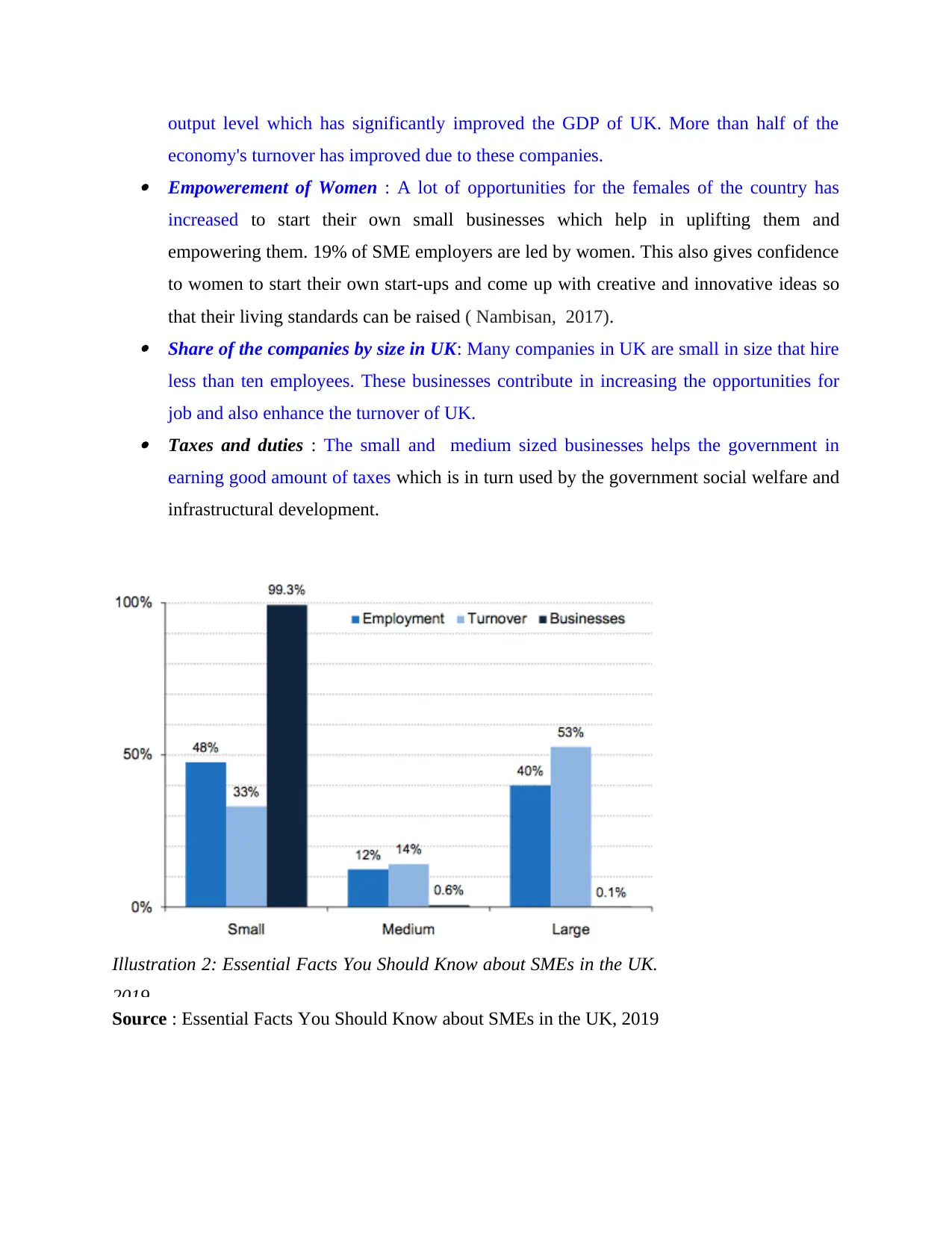
output level which has significantly improved the GDP of UK. More than half of the
economy's turnover has improved due to these companies. Empowerement of Women : A lot of opportunities for the females of the country has
increased to start their own small businesses which help in uplifting them and
empowering them. 19% of SME employers are led by women. This also gives confidence
to women to start their own start-ups and come up with creative and innovative ideas so
that their living standards can be raised ( Nambisan, 2017). Share of the companies by size in UK: Many companies in UK are small in size that hire
less than ten employees. These businesses contribute in increasing the opportunities for
job and also enhance the turnover of UK. Taxes and duties : The small and medium sized businesses helps the government in
earning good amount of taxes which is in turn used by the government social welfare and
infrastructural development.
Illustration 2: Essential Facts You Should Know about SMEs in the UK.
2019
Source : Essential Facts You Should Know about SMEs in the UK, 2019
economy's turnover has improved due to these companies. Empowerement of Women : A lot of opportunities for the females of the country has
increased to start their own small businesses which help in uplifting them and
empowering them. 19% of SME employers are led by women. This also gives confidence
to women to start their own start-ups and come up with creative and innovative ideas so
that their living standards can be raised ( Nambisan, 2017). Share of the companies by size in UK: Many companies in UK are small in size that hire
less than ten employees. These businesses contribute in increasing the opportunities for
job and also enhance the turnover of UK. Taxes and duties : The small and medium sized businesses helps the government in
earning good amount of taxes which is in turn used by the government social welfare and
infrastructural development.
Illustration 2: Essential Facts You Should Know about SMEs in the UK.
2019
Source : Essential Facts You Should Know about SMEs in the UK, 2019
⊘ This is a preview!⊘
Do you want full access?
Subscribe today to unlock all pages.

Trusted by 1+ million students worldwide
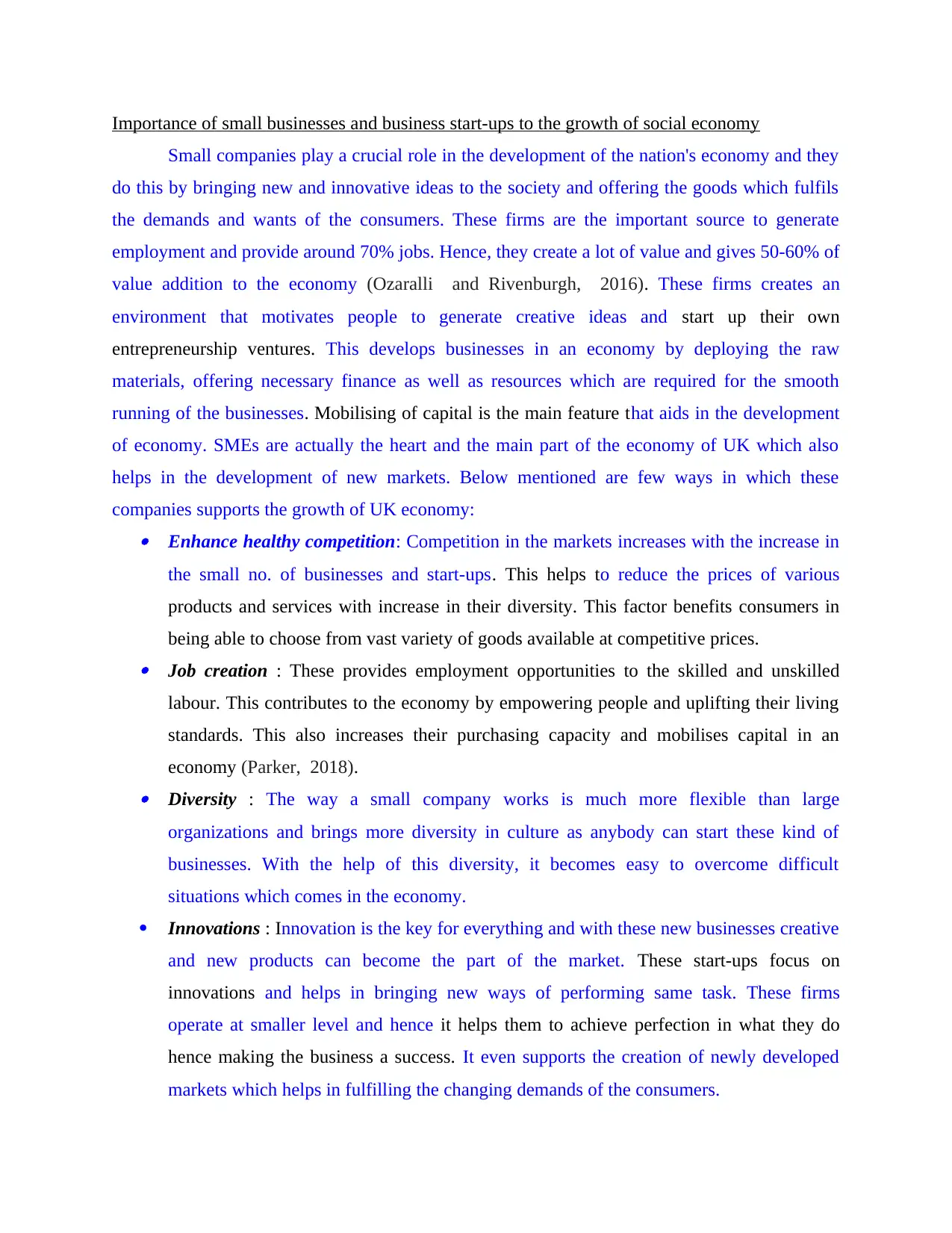
Importance of small businesses and business start-ups to the growth of social economy
Small companies play a crucial role in the development of the nation's economy and they
do this by bringing new and innovative ideas to the society and offering the goods which fulfils
the demands and wants of the consumers. These firms are the important source to generate
employment and provide around 70% jobs. Hence, they create a lot of value and gives 50-60% of
value addition to the economy (Ozaralli and Rivenburgh, 2016). These firms creates an
environment that motivates people to generate creative ideas and start up their own
entrepreneurship ventures. This develops businesses in an economy by deploying the raw
materials, offering necessary finance as well as resources which are required for the smooth
running of the businesses. Mobilising of capital is the main feature that aids in the development
of economy. SMEs are actually the heart and the main part of the economy of UK which also
helps in the development of new markets. Below mentioned are few ways in which these
companies supports the growth of UK economy: Enhance healthy competition: Competition in the markets increases with the increase in
the small no. of businesses and start-ups. This helps to reduce the prices of various
products and services with increase in their diversity. This factor benefits consumers in
being able to choose from vast variety of goods available at competitive prices. Job creation : These provides employment opportunities to the skilled and unskilled
labour. This contributes to the economy by empowering people and uplifting their living
standards. This also increases their purchasing capacity and mobilises capital in an
economy (Parker, 2018). Diversity : The way a small company works is much more flexible than large
organizations and brings more diversity in culture as anybody can start these kind of
businesses. With the help of this diversity, it becomes easy to overcome difficult
situations which comes in the economy.
Innovations : Innovation is the key for everything and with these new businesses creative
and new products can become the part of the market. These start-ups focus on
innovations and helps in bringing new ways of performing same task. These firms
operate at smaller level and hence it helps them to achieve perfection in what they do
hence making the business a success. It even supports the creation of newly developed
markets which helps in fulfilling the changing demands of the consumers.
Small companies play a crucial role in the development of the nation's economy and they
do this by bringing new and innovative ideas to the society and offering the goods which fulfils
the demands and wants of the consumers. These firms are the important source to generate
employment and provide around 70% jobs. Hence, they create a lot of value and gives 50-60% of
value addition to the economy (Ozaralli and Rivenburgh, 2016). These firms creates an
environment that motivates people to generate creative ideas and start up their own
entrepreneurship ventures. This develops businesses in an economy by deploying the raw
materials, offering necessary finance as well as resources which are required for the smooth
running of the businesses. Mobilising of capital is the main feature that aids in the development
of economy. SMEs are actually the heart and the main part of the economy of UK which also
helps in the development of new markets. Below mentioned are few ways in which these
companies supports the growth of UK economy: Enhance healthy competition: Competition in the markets increases with the increase in
the small no. of businesses and start-ups. This helps to reduce the prices of various
products and services with increase in their diversity. This factor benefits consumers in
being able to choose from vast variety of goods available at competitive prices. Job creation : These provides employment opportunities to the skilled and unskilled
labour. This contributes to the economy by empowering people and uplifting their living
standards. This also increases their purchasing capacity and mobilises capital in an
economy (Parker, 2018). Diversity : The way a small company works is much more flexible than large
organizations and brings more diversity in culture as anybody can start these kind of
businesses. With the help of this diversity, it becomes easy to overcome difficult
situations which comes in the economy.
Innovations : Innovation is the key for everything and with these new businesses creative
and new products can become the part of the market. These start-ups focus on
innovations and helps in bringing new ways of performing same task. These firms
operate at smaller level and hence it helps them to achieve perfection in what they do
hence making the business a success. It even supports the creation of newly developed
markets which helps in fulfilling the changing demands of the consumers.
Paraphrase This Document
Need a fresh take? Get an instant paraphrase of this document with our AI Paraphraser
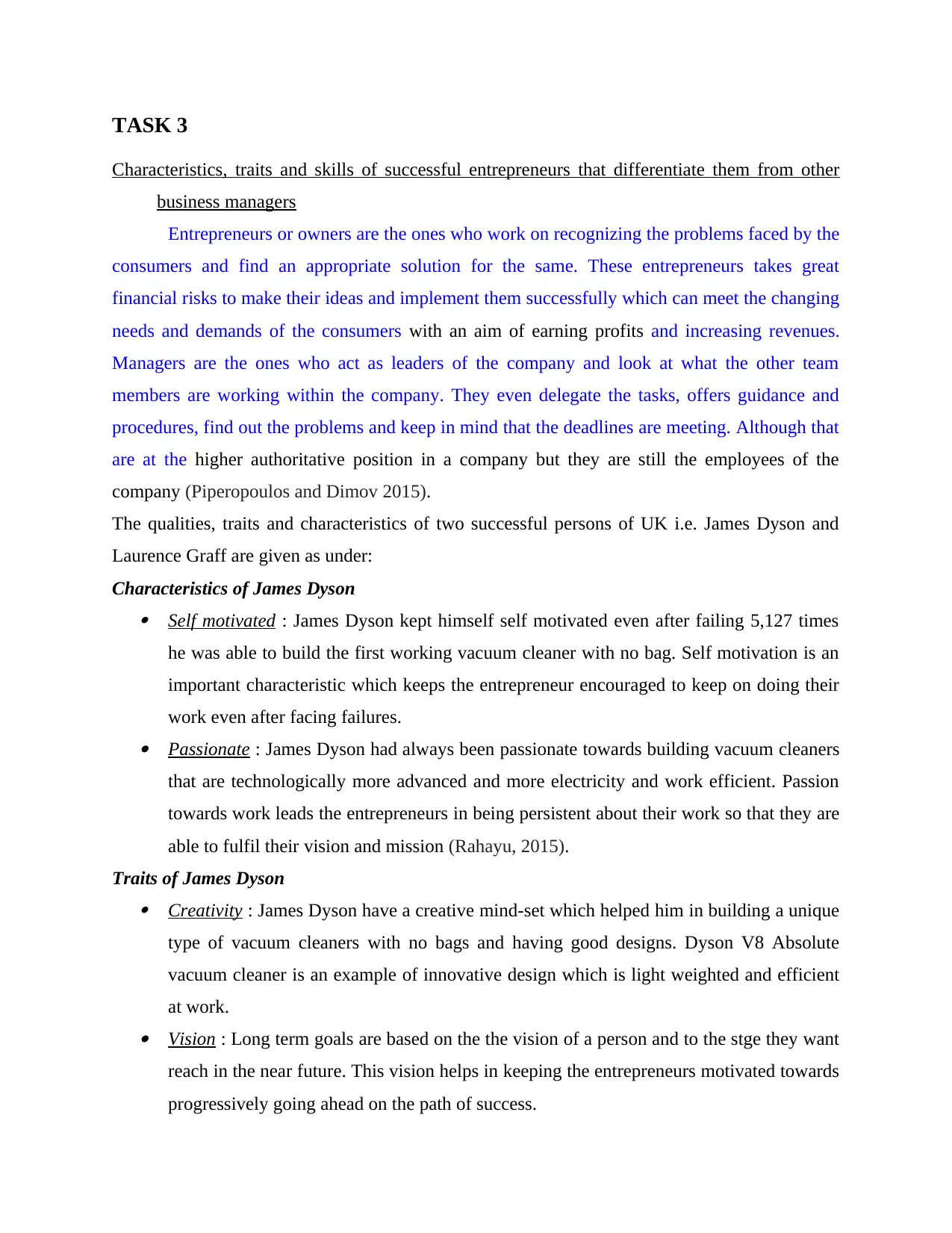
TASK 3
Characteristics, traits and skills of successful entrepreneurs that differentiate them from other
business managers
Entrepreneurs or owners are the ones who work on recognizing the problems faced by the
consumers and find an appropriate solution for the same. These entrepreneurs takes great
financial risks to make their ideas and implement them successfully which can meet the changing
needs and demands of the consumers with an aim of earning profits and increasing revenues.
Managers are the ones who act as leaders of the company and look at what the other team
members are working within the company. They even delegate the tasks, offers guidance and
procedures, find out the problems and keep in mind that the deadlines are meeting. Although that
are at the higher authoritative position in a company but they are still the employees of the
company (Piperopoulos and Dimov 2015).
The qualities, traits and characteristics of two successful persons of UK i.e. James Dyson and
Laurence Graff are given as under:
Characteristics of James Dyson Self motivated : James Dyson kept himself self motivated even after failing 5,127 times
he was able to build the first working vacuum cleaner with no bag. Self motivation is an
important characteristic which keeps the entrepreneur encouraged to keep on doing their
work even after facing failures. Passionate : James Dyson had always been passionate towards building vacuum cleaners
that are technologically more advanced and more electricity and work efficient. Passion
towards work leads the entrepreneurs in being persistent about their work so that they are
able to fulfil their vision and mission (Rahayu, 2015).
Traits of James Dyson Creativity : James Dyson have a creative mind-set which helped him in building a unique
type of vacuum cleaners with no bags and having good designs. Dyson V8 Absolute
vacuum cleaner is an example of innovative design which is light weighted and efficient
at work. Vision : Long term goals are based on the the vision of a person and to the stge they want
reach in the near future. This vision helps in keeping the entrepreneurs motivated towards
progressively going ahead on the path of success.
Characteristics, traits and skills of successful entrepreneurs that differentiate them from other
business managers
Entrepreneurs or owners are the ones who work on recognizing the problems faced by the
consumers and find an appropriate solution for the same. These entrepreneurs takes great
financial risks to make their ideas and implement them successfully which can meet the changing
needs and demands of the consumers with an aim of earning profits and increasing revenues.
Managers are the ones who act as leaders of the company and look at what the other team
members are working within the company. They even delegate the tasks, offers guidance and
procedures, find out the problems and keep in mind that the deadlines are meeting. Although that
are at the higher authoritative position in a company but they are still the employees of the
company (Piperopoulos and Dimov 2015).
The qualities, traits and characteristics of two successful persons of UK i.e. James Dyson and
Laurence Graff are given as under:
Characteristics of James Dyson Self motivated : James Dyson kept himself self motivated even after failing 5,127 times
he was able to build the first working vacuum cleaner with no bag. Self motivation is an
important characteristic which keeps the entrepreneur encouraged to keep on doing their
work even after facing failures. Passionate : James Dyson had always been passionate towards building vacuum cleaners
that are technologically more advanced and more electricity and work efficient. Passion
towards work leads the entrepreneurs in being persistent about their work so that they are
able to fulfil their vision and mission (Rahayu, 2015).
Traits of James Dyson Creativity : James Dyson have a creative mind-set which helped him in building a unique
type of vacuum cleaners with no bags and having good designs. Dyson V8 Absolute
vacuum cleaner is an example of innovative design which is light weighted and efficient
at work. Vision : Long term goals are based on the the vision of a person and to the stge they want
reach in the near future. This vision helps in keeping the entrepreneurs motivated towards
progressively going ahead on the path of success.
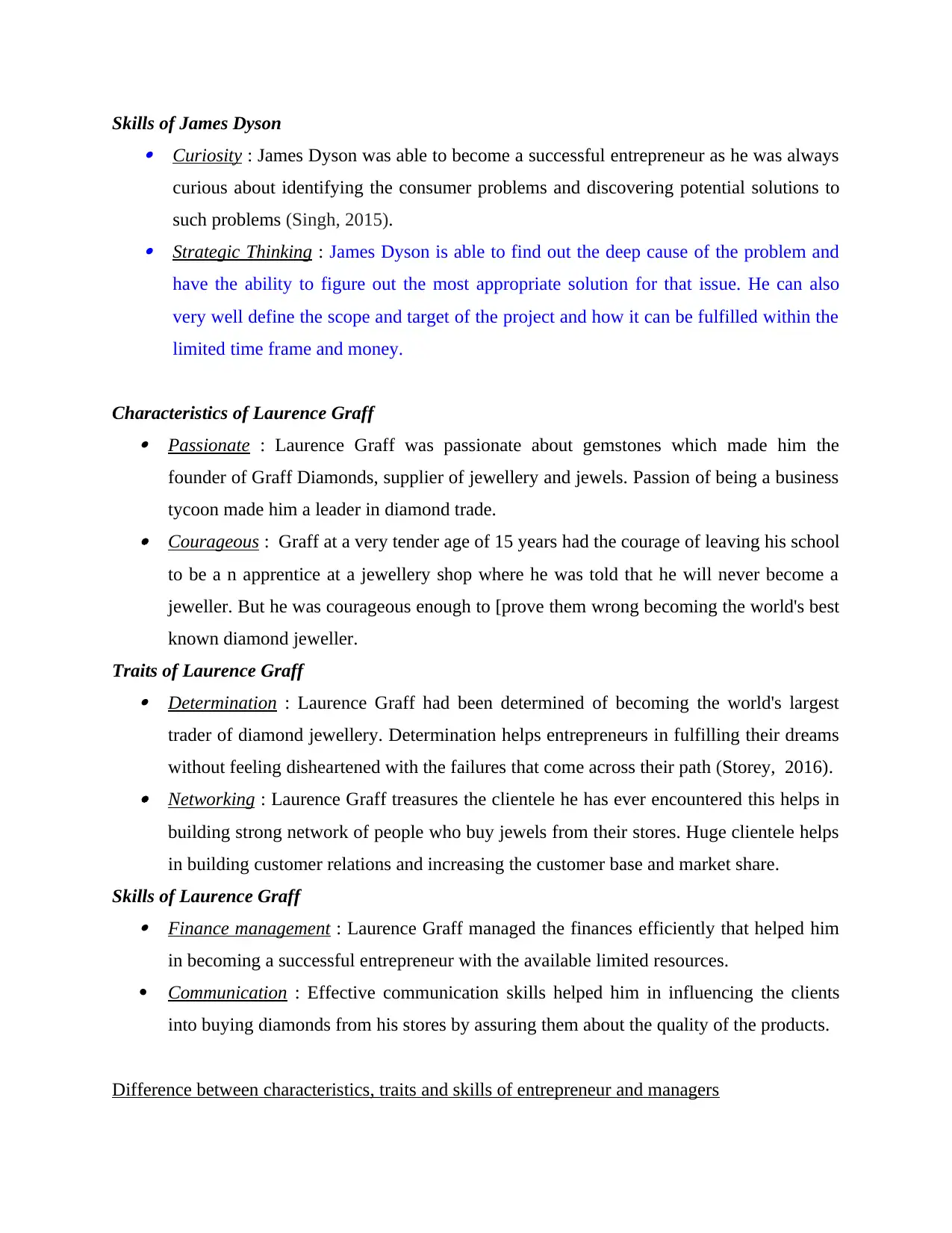
Skills of James Dyson Curiosity : James Dyson was able to become a successful entrepreneur as he was always
curious about identifying the consumer problems and discovering potential solutions to
such problems (Singh, 2015). Strategic Thinking : James Dyson is able to find out the deep cause of the problem and
have the ability to figure out the most appropriate solution for that issue. He can also
very well define the scope and target of the project and how it can be fulfilled within the
limited time frame and money.
Characteristics of Laurence Graff Passionate : Laurence Graff was passionate about gemstones which made him the
founder of Graff Diamonds, supplier of jewellery and jewels. Passion of being a business
tycoon made him a leader in diamond trade. Courageous : Graff at a very tender age of 15 years had the courage of leaving his school
to be a n apprentice at a jewellery shop where he was told that he will never become a
jeweller. But he was courageous enough to [prove them wrong becoming the world's best
known diamond jeweller.
Traits of Laurence Graff Determination : Laurence Graff had been determined of becoming the world's largest
trader of diamond jewellery. Determination helps entrepreneurs in fulfilling their dreams
without feeling disheartened with the failures that come across their path (Storey, 2016). Networking : Laurence Graff treasures the clientele he has ever encountered this helps in
building strong network of people who buy jewels from their stores. Huge clientele helps
in building customer relations and increasing the customer base and market share.
Skills of Laurence Graff Finance management : Laurence Graff managed the finances efficiently that helped him
in becoming a successful entrepreneur with the available limited resources.
Communication : Effective communication skills helped him in influencing the clients
into buying diamonds from his stores by assuring them about the quality of the products.
Difference between characteristics, traits and skills of entrepreneur and managers
curious about identifying the consumer problems and discovering potential solutions to
such problems (Singh, 2015). Strategic Thinking : James Dyson is able to find out the deep cause of the problem and
have the ability to figure out the most appropriate solution for that issue. He can also
very well define the scope and target of the project and how it can be fulfilled within the
limited time frame and money.
Characteristics of Laurence Graff Passionate : Laurence Graff was passionate about gemstones which made him the
founder of Graff Diamonds, supplier of jewellery and jewels. Passion of being a business
tycoon made him a leader in diamond trade. Courageous : Graff at a very tender age of 15 years had the courage of leaving his school
to be a n apprentice at a jewellery shop where he was told that he will never become a
jeweller. But he was courageous enough to [prove them wrong becoming the world's best
known diamond jeweller.
Traits of Laurence Graff Determination : Laurence Graff had been determined of becoming the world's largest
trader of diamond jewellery. Determination helps entrepreneurs in fulfilling their dreams
without feeling disheartened with the failures that come across their path (Storey, 2016). Networking : Laurence Graff treasures the clientele he has ever encountered this helps in
building strong network of people who buy jewels from their stores. Huge clientele helps
in building customer relations and increasing the customer base and market share.
Skills of Laurence Graff Finance management : Laurence Graff managed the finances efficiently that helped him
in becoming a successful entrepreneur with the available limited resources.
Communication : Effective communication skills helped him in influencing the clients
into buying diamonds from his stores by assuring them about the quality of the products.
Difference between characteristics, traits and skills of entrepreneur and managers
⊘ This is a preview!⊘
Do you want full access?
Subscribe today to unlock all pages.

Trusted by 1+ million students worldwide
1 out of 17
Related Documents
Your All-in-One AI-Powered Toolkit for Academic Success.
+13062052269
info@desklib.com
Available 24*7 on WhatsApp / Email
![[object Object]](/_next/static/media/star-bottom.7253800d.svg)
Unlock your academic potential
Copyright © 2020–2026 A2Z Services. All Rights Reserved. Developed and managed by ZUCOL.



